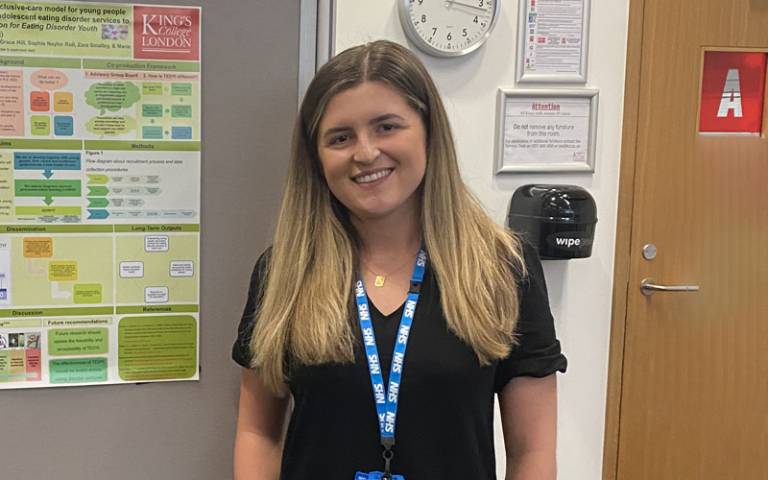Grace was a Psychology with Education BSc student, class of 2021. She talks to us about her experience studying at IOE.
 What were your first impressions of UCL?
What were your first impressions of UCL?

I was really impressed with the welcome onto the course – a specific welcome event, where peers and staff could informally meet prior to teaching. This gave really good first impressions, as it added a personalised approach to university teaching and learning and eased anxiety through a gradual insight into student life. I feel this further facilitated professional and professional relationships amongst staff and coursemates from the offset and throughout the course.
What did you enjoy most about your degree programme?
One of the great things about second year was being able to take a language module as an optional module.
“For this, I chose to learn British Sign Language and came out with a Level 1 certificate, which was especially helpful for part-time role of working as a learning support assistant in a SEND school.
My favourite module and most applicable to my working career thus far was the Cognitive Behavioural Therapy: Applications and Practice module. In particular, learning the basics to formulation was essential for me at an interview point, where I trained as an Educational Mental Health Practitioner PGDip.
What was the biggest challenge you faced while studying?
Covid-19! Going online for half of my course definitely required some adapting. However, I felt that the course team listened to my cohort's feedback using the student voice platform, where we could express concerns and suggest ideas to our course team. This led to changes in how we were assessed in our course work, adaptations to online-learning and accessing resources e.g., responding to Moodle questions in a timely manner, being more available on Teams and posting additional resources on Moodle aside from just the pre/post lecture slides and notes.
What are your long-term career plans and have you used any of the services provided by UCL Careers?
My ultimate goal is to be a Clinical Psychologist. In my final year, I scheduled a call with the UCL Careers team and met a rep who was incredibly helpful and insightful. Whilst he wasn't a Psychology expert, he took additional time to explore various routes to obtain a place on the DClinPsy, as well as suggesting ways I could explore this myself.
“For example, he urged me to set up a LinkedIn page and connect with UCL Alumni, where I could see Clinical Psychologists' experiences and education to help me get an idea of the types of experience I needed.
Furthermore, we were able to discuss the current experience I had and how I could both build on and expand on that experience to develop in my career. For example, I had experience with children/young people with SEND but did not have experience of people with mental health difficulties. Hereby, we discussed the differences between Master's and Postgraduate Diplomas, discussing strengths and weakness, which allowed me to make an informed decision to opt for the PGDip.
“From scheduling the first meeting, to a further 2-3 meetings, we both did our "homework" and the knowledge and understanding I gained from this service led me to where I am now.
Tell us what it was like to live and study in London.
I originally thought that commuting to university and not living on campus would put me at a disadvantage socially. However, I met lots of people on the course that either similarly commuted or stayed on campus/in London.
“Being in London offered the opportunity for me to continue my part-time job in a SEND school on non-uni days.
You could attend events nearby in London, and there were plenty of part-time jobs available (a lot of people on my course did nanny jobs nearby), and you are within walking distance to shops, restaurants and pubs/bars.
Where did you prefer to study?
I preferred to study in the IOE library study rooms that you could book out. I often scheduled this with classmates on the course, and we would either study independently or think of how to approach different assignments, occasionally planned coursework/revision and exam timetables together, and gave peer-feedback.
If I was on my own, I also liked going to the bottom floor/quiet zone of the library to dedicate specific time to my studies whilst also allowing myself time to travel home, where I could then switch off for the evening.
What did you do when you weren't studying?
I worked part-time as a Learning Support Assistant in a SEND school and was a private tutor for English and Maths KS2 primary. I volunteered as a SHOUT UK volunteer, offering in-the-moment support by working with texters to help them move from a "hot moment" to a "cool calm".
During my final year, I was a Wellbeing Assistant in a local secondary school, where I delivered individual guided self-help and emotional literacy interventions, alongside small group workshops. I supported young people aged 11-16 with well-being, as well as a range of mild-moderate mental health problems, including anxiety, low mood, self-esteem and friendships. This was a particularly important role given the necessity to support pupils as they transitioned post-lockdown. I began as a volunteer and then took on a paid, part-time position.
Have you benefited from any work experience or internships offered by UCL?
In my second and third year, I was a Transition Mentor. All first-year students are placed into a small mentoring group led by one transition mentor. I mentored a small group of first-year students as they adapted and transitioned into UCL student-life, though this was extended from Christmas to April given the Covid-19 pandemic.
Mentoring sessions took place online via Zoom in order to communicate with mentees worldwide, which was particularly important during these uncertain times, as universities adapted to online teaching.
“As a transition mentor, I provided support and answered questions related to academic topics, health, finance and careers. I also controlled an online forum for my group to communicate information and organise sessions.
During my final year, I was offered an opportunity to volunteer as a Research Assistant with one of the lecturers on the course, which focused on a study exploring parent-child relationships, related to the ESO task (Pike & Oliver, 2019). The role involved exploring current literature and gathering information from existing, related projects. However, I chose to end this role due to feeling overwhelmed with my paid part-time role and completing my dissertation.
“Upon graduating, I reached out to two lecturers on the course asking for research experience. From this, I supported Year 3 2023 graduates with their Undergraduate dissertations, and was also put in touch with a lecturer at KCL who works on projects alongside academics at UCL.
I have since been exposed to a wide range of experiences in research and academia and am working as a part-time Honorary Research Assistant.
Have you used any of UCL’s support or welfare services, and how did they help?
My personal tutor was fantastic during my Undergraduate degree and has continued to be since graduating. From helping me with personal stressors, problem-solving, organisation, and simply being someone to talk to and get advice from during my Undergraduate degree, to supporting me with providing references, networking and showing an interest in my career journey post-graduation, having an academic tutor was more than what I could have anticipated. I'm forever grateful for their support.
During my first year, I received a 2:2 in one of my research methods reports, and I was devastated due to working so hard. Upon approaching my lecturer, they scheduled a one-on-one academic meeting, where we discussed feedback and how improvements could be made next time. This meeting was key to success in my dissertation, where the pointers helped me throughout my course, just because my lecturer was approachable so I could ask for help and be given additional time for support.
Sum up your time at UCL in three words:
Sociable, successful, supportive.
Last updated 24 July 2023.
 Close
Close


